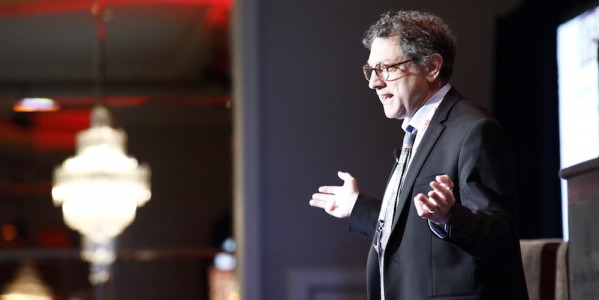CDSA Exclusive

Kaplan: Hollywood Deserves Critical Infrastructure Status
Story Highlights
UNIVERSAL CITY, Calif. — It’s a story almost too bizarre to be true: In 1983, President Reagan got a private screening of the now-classic Matthew Broderick hit “WarGames,” and just days later, Reagan recounted the cyber security nightmare of the movie with his national security advisors, expressing concerns whether the events of the film could really happen.
That discussion would result in the first-ever American government-sponsored cyber security risk report, despite the initial misgivings of Reagan’s advisers. Just a few months earlier, Reagan had given a nationally televised address (suggesting a space-based anti-missile program, later dubbed “Star Wars”) that was criticized as unfeasible.
“[Reagan’s advisors] we’re wondering ‘Where is the old man going now?’” said government cyber security expert Fred Kaplan, speaking May 25 during a keynote address at the “Holly-wired: Where IT and Entertainment Meet” event. But it turns out Reagan was right to be concerned. And, according to Kaplan, there are modern-day parallels to be had, when it comes to government, Hollywood, and cyber security.
At the “Holly-wired” event, Kaplan — winner of a Pulitzer Prize with the “Boston Globe,” current “War Stories” columnist for “Slate,” and author of five books centered around American government (most recently “Dark Territory: The Secret History of Cyber War”) — pointed to what happened after Sony Pictures suffered one of the worst cyber attacks in Hollywood history in late 2014.
After hackers made away with mountains of Sony employee data, leaked high-quality versions of several films, and threatened violence if the studio allowed the anti-North Korean comedy “The Interview” to be released, President Obama did something no other president had done before: he not only addressed a cyber attack against a private company, he promised retaliation.
“In this interconnected, digital world, there are going to be opportunities for hackers to engage in cyber assaults both in the private sector and the public sector,” Obama said Dec. 19, 2014, during his end-of-year press conference. “[North Korea] caused a lot of damage, and we will respond. We will respond proportionally, and we’ll respond in a place and time and manner that we choose.”
Kaplan said he considers what Obama said (addressing a foreign attack on a Hollywood corner of American free speech) and what Reagan did (looking toward a Hollywood film as a warning) as proof that the media and entertainment industry could be considered a “critical infrastructure” in the eyes of the federal government, worth protecting as much as the country’s financial systems, water supplies and power grid.
American entertainment is the country’s No. 1 export. It’s a representation of the free speech values the country touts. And the industry’s IT and security experts are uniquely positioned to offer up new strategies and solutions for cyber security, Kaplan said. Hollywood shouldn’t be hesitant to push how important its business is, and how it needs the same cyber security attention afforded to other American industries.
“I’m not saying it’s going to solve all your problems,” Kaplan said of Hollywood asking for more cyber security attention from the federal government. “But it would help to get it out in the open.”









